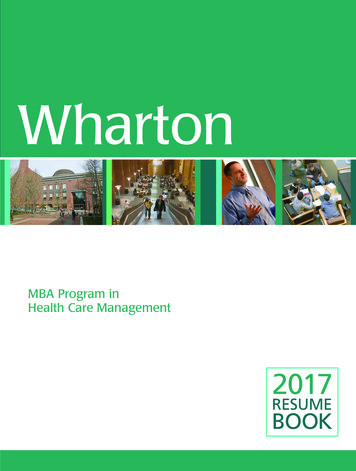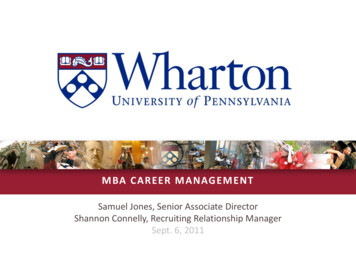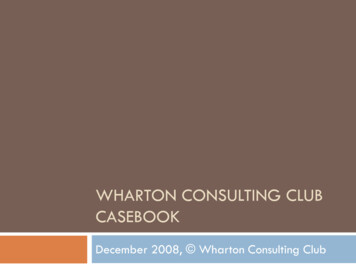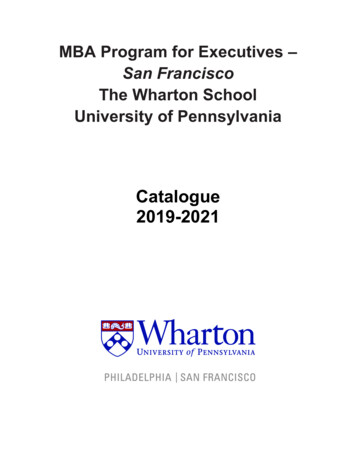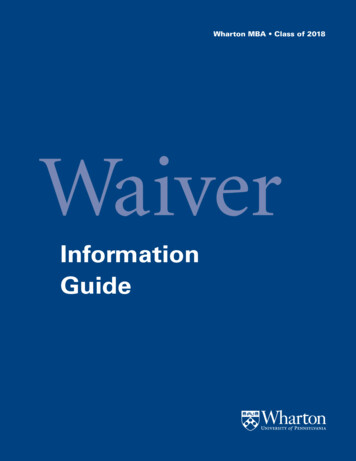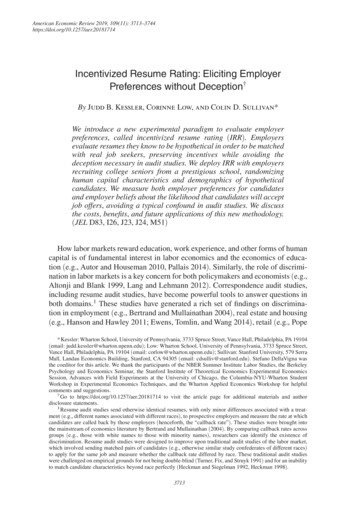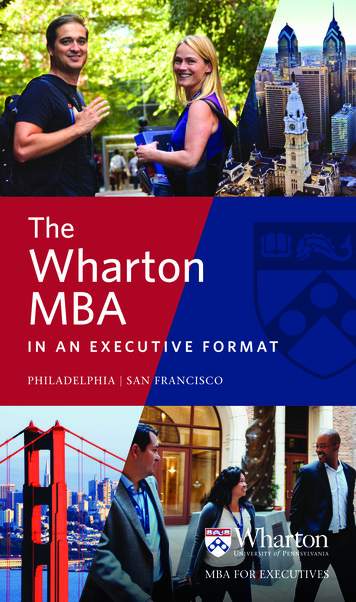
Transcription
Munich Personal RePEc ArchiveHow and Why Wharton Business Schoolbecame World Topper – A Case Studyon Organizational Quest for Excellence ofFirst US Business SchoolAithal, Architha and Aithal, SreeramanaThird year Pharma D., Srinivas College of Pharmacy, Valachil,Mangalore-574143, INDIA, Srinivas Institute of ManagementStudies, Srinivas University, Mangalore, India16 January 2018Online at https://mpra.ub.uni-muenchen.de/85727/MPRA Paper No. 85727, posted 08 Apr 2018 07:04 UTC
HOW and Why Wharton Business School became WorldTopper – A Case Study on Organizational Quest forExcellence of First US Business School1Architha Aithal, & P. S. AithalThird year Pharma D., Srinivas College of Pharmacy, Valachil, Mangalore-574143, INDIASrinivas Institute of Management Studies, Srinivas University, Mangalore, IndiaE-mail : psaithal@gmail.comABSTRACTAfter accepting quality higher education as service, many global business schools arecompeting to attract intelligent students to various innovative courses and by training them tobecome further smart, providing better challenging placements in the corporate sector withlucrative salaries. Such schools competing globally by differentiating their education modelthrough top-level infrastructure, globally competitive faculty member, providing industryoriented and research-based curriculum, customized curriculum and teaching methodsthrough providing a choice from an infinite number of electives, and competence basedexamination and evaluation system. Recent ranking results announced by the USA basedElsevier’s SSRN identified Wharton Business School of the University of Pennsylvania, USAas Ranked ONE business school in the world in terms of its number of annual research paperpublications. Wharton’s 235-plus professors are one of the largest, most published faculties atany business school. The standing and affiliated faculty members of WBS work within andcollaborate across 10 academic departments. For 2019 outgoing MBA batch, the schooladmitted 863 students from 65 countries out of 6,692 applicants. In this paper, we haveanalysed the operational and business strategy of Wharton business school in its quest forexcellence and courage to innovate decisions on academic performance and researchperformance and compared with its competitors in the same country like Booth School ofBusiness, Harvard B-School, Stanford Graduate B-School, Stern B-School, Columbia BSchool, and Sloan B-School.Keywords : SSRN Ranking, Wharton Business School, Operational and business strategy inBusiness school, Research case study, Faculty research output, Organizational Strategy,Quest for excellence in higher education.1. INTRODUCTION :Industry analysis and company analysis are considered as a kind of research methods in businessmanagement research [1-3]. Out of many industry sectors, education is considered as an industry ofservices. A business school is a part of global higher education industry which is open for innovationsfor sustainability due to their challenges of self-financed growth and expansion. A business school is auniversity-level institution trains and confers degrees in business administration or businessmanagement [4-5]. Such a school is also known as school of business administration, school ofmanagement, or colloquially b-school or biz school. A business school teaches various topics relatedto business administration and decision making. The topics may be accounting, administration,economics, entrepreneurship, finance, human resource management, international business, logistics,marketing, management information systems, management science, organizational psychology,organizational behaviour, public relations, research methods, real estate, strategy, among others. Mostof the business schools situated around the world offers undergraduate programmes in businessmanagement like BA, B.Sc., B.S. BBA, BMS etc. and postgraduate programmes like M.Sc., M.S.,MBA, MMS, PGDM, Executive MBA etc. research programmes like M.Phil., Ph.D., DBA, Fellow
programmes etc. and post-doctoral programmes like D.Sc., D.Litt. etc. through the campus basedresidential model, campus based full-time model, campus based part-time model, online course modeland also using distance education model. Among them, MBA two years campus based full-timeprogramme is found to be most admirable and successful professional business programme withvarious functional specialization opportunities. Most of the business schools around the world usethree kinds of pedagogy in their teaching-learning methods which include (1) Case based discussionapproach, (2) Concept based discussion approach, and (3) Skill based training approach. The deliverymethods include lecture based, interactive discussion based, experimental learning based, experientiallearning based, and online learning methods are found to be popular in different business schoolsaround the world. Apart from academic innovations, business schools also impart skills andcompetency of independent thinking among the students while making decisions. Hence businessschools have developed a teaching-learning model integrated with individual and group research toimprove the knowledge, skills, and confidence of the students to make them the best decision makersfor un-structure problems and unanticipated challenges. Such models created global industry leaderswith un-precedential capabilities to lead any kind of business. Another advantage of studying inbusiness schools is found to be their involvement in arranging attractive placement opportunities withlucrative salaries at top multi-national companies made such courses highly chargeable in terms oftuition fees. With such reason, all business schools are trying to compete with each other todifferentiate themselves in terms of achieving academic excellence and research productivity. Basedon Elsevier’s SSRN Ranking of December 2017 for a number of research publications during last 12months, global business schools are ranked as shown in Table 1 and USA B-Schools ranking is shownin Table 2.Table 1 : Elsevier’s SSRN Top 1000 World Business Schools Ranking in December 2017 based onNumber of Research paper Publications. (Source : www.ssrn.com)S. No.B-SchoolRankNo. of PublicationsNo. of Facultyduring last 12 months members registeredin SSRN1The Wharton Business School,ONE262449University of Pennsylvania,USA2Booth School of Business,TWO224292University of Chicago, USA3Stern School of Business, New THREE223358York University, USA4SrinivasInstituteof FOUR20952Management Studies, SrinivasUniversity, India5Columbia Business School,FIVE193289Columbia University, USA6Harvard Business School,SIX180365Harvard University, USA7SchoolofBusiness& SEVEN16494Economics,HumboldtUniversity of Berlin, Germany8Sloan School of Management, EIGHT161272MIT, USA9UNSW Business School,NINE152367University of New SouthWales Sydney, Australia10Stanford Graduate School ofTEN131181Business, Stanford University,USA
Table 2 : Elsevier’s SSRN Top 500 B-Schools USA Ranking in December 2017 based on Number ofResearch paper Publications. (Source : www.ssrn.com)S. No.B-SchoolRankNo. of PublicationsNo. of Facultyduring last 12membersmonthsregistered in SSRN1The Wharton Business School,ONE262449University of Pennsylvania2Booth School of Business,TWO224292University of Chicago3Stern School of Business, New THREE223358York University, USA4Columbia Business School,FOUR193289Columbia University, USA5HarvardBusinessSchool,FIVE180365Harvard University, USA6Sloan School of Management,SIX161273MIT, USA7Stanford Graduate School of SEVEN131181Business, Stanford University,USA8Stephen M. Ross School ofEIGHT130230Business,UniversityofMichigan, USA9Darden School of Business,NINE126441University of Virginia, USA10Haas School of Business,TEN118182UniversityofCalifornia,Berkeley, USATable 3 : Elsevier’s SSRN Top 1000 International Business Schools Ranking (Excluding USA) inDecember 2017 based on Number of Research paper Publications. (Source : www.ssrn.com)S. No.B-SchoolRankNo. of PublicationsNo. of Facultyduring last 12membersmonthsregistered in SSRN1SrinivasInstituteofONE20952Management Studies, SrinivasUniversity, niversity of Berlin, Germany3UNSW Business School,THREE152367University of New South WalesSydney, Australia4SingaporeManagementFOUR126286University, Singapore5University of Melbourne FIVE117263Faculty of Business andEconomics, Australia6University of Toronto - RotmanSIX115196School of Management, Canada7MonashBusinessSchool, SEVEN111307Australia8VU University Amsterdam EIGHT102195Faculty of Economics and
910BusinessAdministration,NetherlandsCopenhagen Business School,DenmarkLondonBusinessSchool,United KingdomNINE93288TEN92233As per table 1, major numbers of B-Schools (except three out of ten) which have done more researchpublications during last year are from the USA. While comparing Table 1, Table 2, and Table 3, theWharton Business School of the University of Pennsylvania is found to be maintaining number ONEposition in the category of the number of research publications (262) as well as in terms of the numberof researchers (449). Being the first and oldest business school born and sustaining in the USA,Wharton B-School is maintaining its position both in terms of the number of researchers in a BSchool and the number of research papers published by a B-School. This achievement motivated us tostudy the business (academic and research) strategy of Wharton Business School as a Businessorganization in Education service industry [6].2. OBJECTIVES :The objectives of this case study on a Top B-School of the world is to find answers to the followingissues :(1) To know and analyse the growth and development saga of World Top Business School, i.e.,Wharton Business School.(2) To study and analyse the various academic programmes and the strategies to achieve academicexcellence of Wharton Business School.(3) To study the research & publication strategy of Wharton Business School.(4) To study the Faculty Development & Motivation strategy to achieve Faculty excellence atWharton Business School.(5) To study the contribution of Deans of the school for overseas expansion, starting newprogrammes, and contribution to innovative research as the role models for the stakeholders of theSchool during last ten years.(6) To compare the quest for excellence and courage to innovate strategy on academic performanceand research performance of Wharton Business School with its competitors in the same country likeBooth School of Business, Harvard Business School, Stern Business School, Columbia BusinessSchool, and Sloan Business School.3. WHARTON B-SCHOOL GROWTH SAGA :3.1 History of the School :Founded in 1740, Penn is America’s first university and a member of the Ivy League. The maincampus in Philadelphia was established on the western edge of the city in the 1870s and covers over300 acres of city landscaping. The Wharton Business School of the University of Pennsylvania isstarted by Joseph Wharton, an iron miner, and a self-taught businessman during 1881 by making acontribution of 1,00,000 to the University of Pennsylvania. The early Wharton School gave focus onthe social sciences in its undergraduate curriculum. Between 1895 and 1915, Prof. Edmund Jamesestablished Wharton schools business curriculum by developing and teaching the new subjects ofmanagement and finance. Wharton thus quickly started churning out graduates in businessmanagement who could able to become prominent businessmen in different cities of USA.The University of Pennsylvania founded by Benjamin Franklin which had been a center of theory inliberal arts for a century and a half changed its brand as an innovative university through the newWharton School as most practical school and brought Benjamin Franklin's dream to a new heightwhich Franklin himself never envisioned. Further advancing into a postgraduate curriculum, from1921, Wharton started to award MBA degree in business management and identified as a prominentnational agency of industrial research [6].Wharton Business School moved to its own building on the University campus in 1952 and later, in1959, the undergraduate program was redesigned with radical reform which gave rise to the modernWharton School curriculum. The school further renewed its academic orientation in 1975 by shifting
its social sciences focus to Arts and Sciences. Since then WBS has been able to focus on what it hasalways excelled in, and what it was founded to achieve, presenting students a quality businesseducation and training through its innovative research-based curriculum. The pioneering vision ofWharton B-School was to produce graduates who would become the pillars of the society. Theinstitute intended to maintain a long tradition of educating visionary business leaders in academia,business, government, and not-for-profit organizations. Presently, WBS has expanded the scope ofthis vision to become the most comprehensive source of business knowledge globally with over 235faculty members, 96,000 alumni, 5,000 students across 10 academic departments, 33 research centers,and more than 9,000 executive education participants annually. WBS, being a private business school,has enough freedom to formulate its strategy to make innovations in higher education modelcompared to public and government controlled business schools [7-26].3.2 Power of Wharton Business School :(1) Global Influences :WBS through its Global Engagement strategy allows its stakeholders to explore the world to innovate,learn and create new knowledge to lead in the global environment. WBS also develops and offersGlobal Modular Courses to its Students to engage with business concepts firsthand in intense,immersive workshops held in relevant global locations.(2) Monopoly in Data Analytics :The Wharton Customer Analytics Initiative (WCAI) is the preeminent academic research centerfocusing on the development and application of customer analytics methods. WCAI is the world’spreeminent academic research center focusing on the development and application of customeranalytics methods. Through our innovative Research Opportunity program and R&D“crowdsourcing” approach, WCAI enables academic researchers from around the world to helpcompanies understand how to better monetize the individual-level data they collect about customersthrough the development and application of new predictive models. We marry our work withcompanies and researchers around the world with a range of co-curricular student programs that fostertalent development and recruitment.Launched with a generous gift from Wharton alumnus Art Bilger and his wife, Dahlia, and anexecutive partnership with Omnicom Group, Inc., WCAI has a broad impact on the practice of datadriven business decision-making, and the dissemination of relevant insights to managers, students,and policymakers. Customer Analytics refers to the collection, management, analysis and strategicleverage of a firm’s granular data about the behavior(s) of its customers. Customer Analytics can becharacterized as:Table 4 : Features of Customers AnalyticsS. No. FeatureDetails1BehaviouralPrimarily focus on observed behavioural pattern2LongitudinalIt is all about how these behaviours manifest themselvesover time3Inherently GranularFocused to individual level4Forward LookingOrientation towards prediction not only description5Multi-platformCombining behaviours from multiple measurementsystems(3) Entrepreneurship & Innovation :WBS through its Penn Wharton Entrepreneurship programme helps Penn students interested inentrepreneurship & innovation find their unique path and career. Penn Wharton Entrepreneurshipprogram helps Penn students who are interested in entrepreneurship & innovation to find their uniquepath and career. With the objective of creating and nurturing entrepreneurs, through exploring newbusiness opportunities and start-ups, developing a venture, launching a start-up, and scaling it to newheights. This is done through following four was :
(i) Provides an entrepreneurship tool in the name of Penn entrepreneurship Ecosystem that bringstogether all the entrepreneurial resources available at Penn, in the Philadelphia region, and at WhartonSan Francisco for its students, alumni, and open public.(ii) Helps new and budding entrepreneurs, through a consultation model called Start here Mondays todiscuss and get suggestions from Wharton Staff members on every Monday. This model helps theinterested students, alumni, and even public to start a new business.(iii) Through classroom based training by providing Entrepreneurship and Innovation as a major forMBAs and a specialization for undergraduates and training experience theory and practice in and outof the classroom with world-renowned faculty or successful business owners WBS distinguished byits ability to combine theory with practice, allowing students to gain access and insight from theentrepreneurial business community. Students and faculty members are also encouraged to doinnovative research in a Sol C. Snider Entrepreneurial Research Center which is the first centerdedicated to the study of entrepreneurship.(iv) Funding the new creative ideas through organizing competitions periodically, offering prizes andawards, funding the start-up projects by offering Wharton Innovation Fund.(4) Online Learning :Through thoughtful and sensitive experimentation with technology, we provide accessible andmeaningful learning experiences to learners around the world. Wharton offers multiple openenrolment online learning opportunities, from free individual courses to specialized programs, tohigh-touch professional education [14].Table 5 : List of Online courses offered by Wharton as 30/12/2017S. No. Course TypeNumber of CollaborativeCoursesService provider(29)1Businesssuccess 04Courserarelated Courses2Achieving Business CourseraRelated Courses4AnalyticsRelated 04CourseraCourses5Functional Area of 04CourseraBusinessRelatedCourses6OtherBusiness 04edXRelated Courses7DecisionBusiness 05CourseraRelated CoursesDurationFee/Course04 weeks-04 weeks-04 weeks-04 weeks-04 weeks-06 weeksRs. 37,46804 weeks-(5) Expanded Leadership :WBS focuses on how to apply new business principles which are the outcome of its researchinitiatives on public policies. The policy issues of many important areas in the society includingeducation, energy, environment, national budget, health insurance, finance, housing, labour, riskmanagement, social insurance, technology, telecommunications, trade, urban development, etc. byidentifying and predicting the trends on debit, employment, healthcare, tax, etc and its impact onbusiness & society. Through expanded leadership initiative, WBS wants to enhance the contributionof B-Schools for better public policies. WBS also organizes a 90 minutes session every month on itsresearch contribution on public policy influence.(6) Social Impact :The Wharton Social Impact Initiative advances the science and practice of social impact throughresearch, hands-on training, and outreach. As the leading research-led business school in the world,
Wharton is building the evidence base for impact investing and more through its rigorous academicresearch. Through its experiential learning model, offering training opportunities, and thoughtleadership initiatives in training and outreach, WBS is growing the talent pipeline for social impactbusiness leaders of the today and the future.4. WHARTON ACADEMIC PROGRAMMES :Through its societal inclusive strategy of everybody throughout the world, Wharton offers a broadslate of academic programs for every stage from pre-college to executive, under seven headings.4.1 Undergraduate Programmes :(1) BS in Economics :Wharton’s undergraduate degree program offers an innovative program on business and more — aninnovative program that combines business and liberal arts on one Ivy League campus. Studentschoose specialized areas of study with more than 20 concentrations offered across the 10 differentdepartments. Graduates earn a BS in Economics from the Wharton School.(2) BA/BS in International Studies :This unique, four-year interdisciplinary undergraduate program integrates business education,advanced language training, and a liberal arts education through its Huntsman graduates programme.Huntsman graduates earn two degrees — a BA in International Studies from the School of Arts andSciences and a BS in Economics from Wharton.(3) BS/BSE/BAS in Management & Technology :The M&T Program focuses on the technical and managerial skills necessary to define and solveproblems in today’s complex technologically intensive society. Graduates earn both a BS inEconomics from Wharton and either a BS or a BAS in Engineering from the School of Engineeringand Applied Science.(4) BA/BS in Life Sciences & Technology :The Roy and Diana Vagelos flagship Program offers an innovative, interdisciplinary curriculum thatcombines extensive coursework in both bioscience and business and prepares students for careers inthe rapidly expanding life sciences sector. Graduates earn a BA in Life Sciences from the College ofArts and Sciences and a BS in Economics from Wharton.(5) BS in Nursing & Healthcare Management :This coordinated dual-degree program addresses the dynamic changes in the delivery and financing ofhealth care services in the United States and the public’s concern about the quality, cost, andmanagement of health care. The program combines a BS in Nursing from the School of Nursing witha BS in Economics from Wharton.(6) Other Dual Degree Programmes :Wharton students can pursue an additional degree by designing their own dual-degree program,choosing from among more than 50 areas of study at Penn’s three other undergraduate schools: theCollege of Arts & Sciences, the School of Nursing, and the School of Engineering & Applied Science.4.2 Postgraduate Programmes :(1) MBA Flagship Programme :The Wharton MBA offers unmatched global options and a distinctly collaborative experience — withmore courses and programs than any other business school. Students get the business knowledge andspecialized skills to expand career choices and join one of the world’s largest and most prestigiousalumni networks.(2) MBA for Executives :Available in Philadelphia and San Francisco, the Wharton MBA for Executives is the full WhartonMBA — the same degree, innovative curriculum, and world-class faculty as in Wharton’s globallyacclaimed full-time program – in a specially designed part-time schedule.(3) MBA/MA Dual Degree Programme :The first joint-degree program in international management, the MBA/MA Lauder Program preparesfuture business leaders by integrating the Wharton MBA with an MA in International Studies fromPenn’s School of Arts & Sciences. The program emphasizes cross-cultural competency and advancedlanguage training.(4) JD/MBA Dual Degree Programme :
The Francis J. & Wm. Polk Carey JD/MBA Program is a fully integrated three-year program thatcombines Wharton’s MBA program with Penn’s elite law.(5) MBA/MA Dual Degree Programme :This 3-year, dual-degree program, which pioneers area studies and the integration of internationalpolitics and economics, is offered with the Nitze School of Advanced International Studies (SAIS) ofThe Johns Hopkins University in Washington, DC. Students work towards a Wharton MBA and anMA in international relations from SAIS.(6) MBA/MPA Dual Degree Programme :Wharton students may choose one of three dual-degree programs with Harvard’s Kennedy School ofGovernment (KSG): Master in Public Administration, Master in Public Administration/InternationalDevelopment, or Master in Public Policy. All are typically two-year programs, but the dual-degreeoption allows students to complete the KSG portion of their dual degree over three semesters.(7) Other Dual Degree Programmes :With 12 world-leading graduate and professional schools at Penn, students can select from thefollowing dual-degree options: Biotechnology, Design, Engineering, Law, Medical Sciences, Nursing,and Social Work. This includes the Francis J. & Wm. Polk Carey JD/MBA Program with Penn Law.4.3 Doctoral Programmes :(1) Ph.D. in Accounting :Wharton’s PhD program in Accounting takes a multidisciplinary approach to meeting the needs oftoday’s complex markets — integrating finance and economics with broader perspectives onorganizational issues and the business environment.(2) Ph.D. in Applied Economics :Wharton’s PhD program in Applied Economics gives students the tools and training to get jobs inbusiness schools, public policy programs, and applied-oriented economics departments. Drawing on alarge faculty of applied economists across multiple Wharton departments and the Law School, theprogram allows specialization in a number of areas.(3) Ph.D. in Ethics & Legal Studies :Wharton’s PhD program in Ethics and Legal Studies is the first doctoral program of its kind, built onWharton’s pioneering work in business ethics. It focuses on ethical and legal norms of conduct inmanagement. Students take core courses in ethics and law in business, plus courses in one additionalconcentration (e.g., management, finance, marketing, or accounting).(4) Ph.D. in Finance :Wharton’s PhD program in Finance provides a solid foundation of the theoretical and empirical toolsof modern finance, drawing heavily on the discipline of economics. Students prepare for careers at theworld’s leading academic institutions in the areas of: Banking and Financial Institutions, CorporateFinance, International Finance, and Financial Instruments and Portfolio Management.(5) Ph.D. in Healthcare Management & Finance :Wharton’s PhD program in Health Care Management and Economics provides an interdisciplinaryhealth services research focus applicable across private and public sectors. The program combinesintensive training in health care systems and health services research with advanced training in atraditional business discipline.(6) Ph.D. in Management :Wharton’s PhD program in Management is flexible and interdisciplinary, applying social sciencedisciplines and research methods to management problems. It offers specializations in strategy,international business, organizational behaviour and theory, and human resource management.(7) Ph.D. in Marketing :Wharton’s PhD program in Marketing is interdisciplinary — students generate creative ideas andhypotheses, develop the analytical skills needed to evaluate them, and receive the training tocommunicate them. Students work with faculty who lead in developing new research methodologiesand implementing new decision models and techniques in the practice of marketing.(8) Ph.D. in Operations, Information Management & Decision Processes :Wharton’s PhD program in Operations, Information Management & Decision Processes emphasizesresearch on real management problems and maintains a balance between theory and implementation.
The faculty trains scholars in decision processes, information and decision technologies, informationstrategy, operations management, and operations research.(9) Ph.D. in Statistics :Wharton’s PhD program in Statistics allows students to engage in both cutting-edge theory andapplied problems. These include problems from a wide variety of fields within Wharton, such asfinance, marketing, and public policy, as well as fields across Penn such as biostatistics within theMedical School and computer science within the Engineering School.4.4 Executive Education Programmes :(1) Wharton Executive Education :Nearly 9,000 executives from around the world participate annually in Wharton Executive Educationopen-enrollment and custom programs. Wharton’s unique Impact Through Education approachdelivers both immediate results to executive participants as well as continued knowledge benefitsthrough follow-on activities.(2) Open Enrollment Executive Education :Find out more about Executive Education’s open-enrollment programs, designed to leave a lastingimpact on executives and their organizations.(3) Custom Programme for Organizations :Partner with some of the brightest minds in business for customized solutions to your organization’sunique challenges.4.5 Global Programmes :(1) Wharton INSEAD Alliance : The Wharton-INSEAD Alliance extends top-quality businesseducation across four dedicated campuses: Wharton’s U.S. campuses in Philadelphia and SanFrancisco, and those of INSEAD in Fontainebleau, France, and Singapore. The Alliance offers studentexchange programs, a collaborative research center, and joint executive education programs.(2) International Exchange Programmes : At the undergraduate level, Wharton offers 20 programs with the world’s top business schools. Penn also has partnerships with more than 100programs across the globe where Wharton students can take arts and sciences courses. For MBAstudents, Wharton offers semester-long international exchange program options at 17 partner schoolsin 15 countries.(3) Wharton/ School of Advanced International Studies : This 3-year, dual-degree program, whichpioneers area studies and the integration of international politics and economics, is offered with theNitze School of Advanced International Studies (SAIS) of The Johns Hopkins University inWashington, DC. Students work towards a Wharton MBA and an MA in international relations fromSAIS.(4) Joseph H. Lauder Institute of Management & International Studies : The first joint-degreeprogram in international management, the MBA/MA Lauder Program prepares future business leadersby integrating the Wharton MBA with an MA in International Studies from Penn’s School of Arts &Sciences. The program emphasizes cross-cultural competency and advanced language training.(5) Huntsman Programme in International Studies & Business : This is a four-yearinterdisciplinary unique undergraduate programme of study that integrates business education,advanced language training, a
Booth School of Business, Harvard Business School, Stern Business School, Columbia Business School, and Sloan Business School. 3. WHARTON B-SCHOOL GROWTH SAGA : 3.1 History of the School : Founded in 1740, Penn is America's first university and a member of the Ivy League. The main

